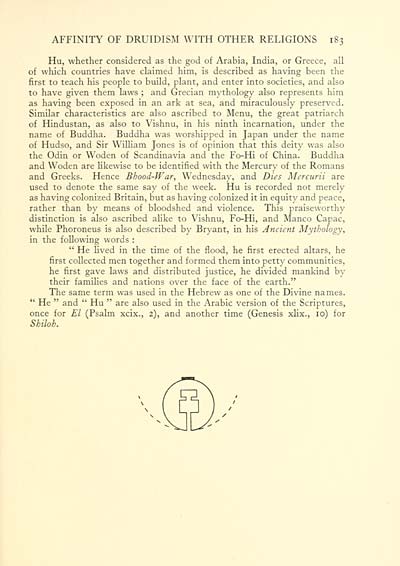Ossian Collection > Druidism
(213)
Download files
Complete book:
Individual page:
Thumbnail gallery: Grid view | List view

AFFINITY OF DRUIDISM WITH OTHER RELIGIONS 183
Hu, whether considered as the god of Arabia, India, or Greece, all
of which countries have claimed him, is described as having been the
first to teach his people to build, plant, and enter into societies, and also
to have given them laws ; and Grecian mythology also represents him
as having been exposed in an ark at sea, and miraculously preserved.
Similar characteristics are also ascribed to Menu, the great patriarch
of Hindustan, as also to Vishnu, in his ninth incarnation, under the
name of Buddha. Buddha was worshipped in Japan under the name
of Hudso, and Sir William Jones is of opinion that this deity was also
the Odin or Woden of Scandinavia and the Fo-Hi of China. Buddha
and Woden are likewise to be identified with the Mercury of the Romans
and Greeks. Hence Bhood-War, Wednesday, and Dies Mercurii are
used to denote the same say of the week. Hu is recorded not merely
as having colonized Britain, but as having colonized it in equity and peace,
rather than by means of bloodshed and violence. This praiseworthy
distinction is also ascribed alike to Vishnu, Fo-Hi, and Manco Capac,
while Phoroneus is also described by Bryant, in his Ancient Mythology,
in the following words :
" He lived in the time of the fiood, he first erected altars, he
first collected men together and formed them into petty communities,
he first gave laws and distributed justice, he divided mankind by
their families and nations over the face of the earth."
The same term was used in the Hebrew as one of the Divine names.
" He " and " Hu " are also used in the Arabic version of the Scriptures,
once for El (Psalm xcix., 2), and another time (Genesis xlix., 10) for
Shiloh.
Hu, whether considered as the god of Arabia, India, or Greece, all
of which countries have claimed him, is described as having been the
first to teach his people to build, plant, and enter into societies, and also
to have given them laws ; and Grecian mythology also represents him
as having been exposed in an ark at sea, and miraculously preserved.
Similar characteristics are also ascribed to Menu, the great patriarch
of Hindustan, as also to Vishnu, in his ninth incarnation, under the
name of Buddha. Buddha was worshipped in Japan under the name
of Hudso, and Sir William Jones is of opinion that this deity was also
the Odin or Woden of Scandinavia and the Fo-Hi of China. Buddha
and Woden are likewise to be identified with the Mercury of the Romans
and Greeks. Hence Bhood-War, Wednesday, and Dies Mercurii are
used to denote the same say of the week. Hu is recorded not merely
as having colonized Britain, but as having colonized it in equity and peace,
rather than by means of bloodshed and violence. This praiseworthy
distinction is also ascribed alike to Vishnu, Fo-Hi, and Manco Capac,
while Phoroneus is also described by Bryant, in his Ancient Mythology,
in the following words :
" He lived in the time of the fiood, he first erected altars, he
first collected men together and formed them into petty communities,
he first gave laws and distributed justice, he divided mankind by
their families and nations over the face of the earth."
The same term was used in the Hebrew as one of the Divine names.
" He " and " Hu " are also used in the Arabic version of the Scriptures,
once for El (Psalm xcix., 2), and another time (Genesis xlix., 10) for
Shiloh.
Set display mode to: Large image | Transcription
Images and transcriptions on this page, including medium image downloads, may be used under the Creative Commons Attribution 4.0 International Licence unless otherwise stated. ![]()
| Early Gaelic Book Collections > Ossian Collection > Druidism > (213) |
|---|
| Permanent URL | https://digital.nls.uk/78952032 |
|---|
| Description | Selected books from the Ossian Collection of 327 volumes, originally assembled by J. Norman Methven of Perth. Different editions and translations of James MacPherson's epic poem 'Ossian', some with a map of the 'Kingdom of Connor'. Also secondary material relating to Ossianic poetry and the Ossian controversy. |
|---|
| Description | Selected items from five 'Special and Named Printed Collections'. Includes books in Gaelic and other Celtic languages, works about the Gaels, their languages, literature, culture and history. |
|---|

